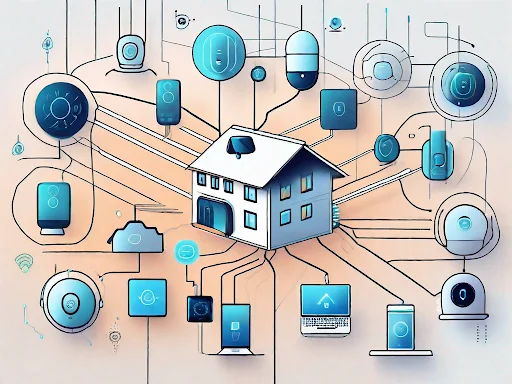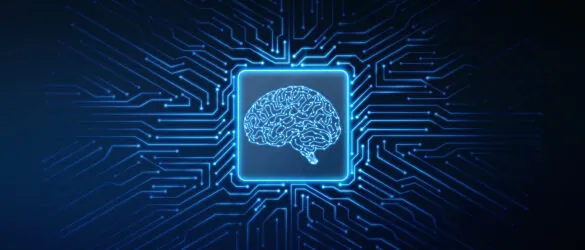AI technology has made significant advancements in recent years, revolutionizing various industries such as healthcare, finance, and transportation. One area where AI has gained notable traction is in smart home technology. In this article, we will explore the basics of AI and its role in smart homes, discuss the benefits and challenges of implementing AI in this context, and examine future trends in AI and smart home technology.
- The Basics of AI and Smart Home Technology
- What is AI?
- The role of AI in smart home technology
- The Intersection of AI and Smart Home Devices
- AI in homes security systems
- AI in home automation
- Setting Up AI for Your Smart Home
- Choosing the right AI technology
- Installation and configuration tips
- The Benefits of Using AI in Your Smart Home
- Enhanced convenience and efficiency
- Improved home security
- Potential Challenges and Solutions in Implementing AI
- Addressing privacy concerns
- Overcoming technical difficulties
- Future Trends in AI and Smart Home Technology
- Predictions for AI in home tech
- Preparing for the future of AI and smart homes
The Basics of AI and Smart Home Technology
What is AI?
Artificial Intelligence (AI) is a revolutionary field that has gained significant traction in recent years. It involves the development of intelligent machines that can analyze and interpret data, learn from experience, and adapt to new information. By mimicking human cognitive processes, AI systems can perform tasks that traditionally require human intelligence.
Machine learning, a subset of AI, focuses on the development of algorithms that allow computers to learn and improve from experience without being explicitly programmed. This technique has revolutionized various industries, including healthcare, finance, and transportation.
Natural language processing (NLP) is another crucial aspect of AI. It involves the interaction between computers and human language, enabling machines to understand, interpret, and respond to human speech. NLP has paved the way for advancements in voice recognition, virtual assistants, and language translation.
Computer vision, yet another facet of AI, focuses on enabling computers to interpret and understand visual information from images or videos. This technology has led to significant breakthroughs in fields such as autonomous vehicles, facial recognition, and object detection.
The role of AI in smart home technology
Smart home technology has become increasingly popular, offering homeowners convenience, comfort, and automation. AI plays a pivotal role in enhancing these smart home systems by enabling them to learn, adapt, and make intelligent decisions based on user preferences and patterns.
AI-powered smart home technology can monitor and control various aspects of a home, such as lighting, temperature, security systems, and appliances. By analyzing data and understanding user behavior, these systems can optimize energy consumption, enhance security measures, and create personalized experiences for homeowners.
Imagine an AI smart home system that learns your daily routine and automatically adjusts the lighting and temperature to match your preferences. With AI, this is not just a futuristic concept but a reality. These systems can also detect anomalies and alert homeowners of potential security breaches, providing peace of mind.
Moreover, AI-driven virtual assistants, such as Amazon’s Alexa or Google Assistant, have become integral parts of making home smart. These voice-activated assistants can perform various tasks, such as playing music, answering questions, and controlling smart devices, all through natural language processing and machine learning algorithms.
As AI continues to evolve, the possibilities for AI smart home technology are endless. From predictive maintenance of appliances to personalized entertainment recommendations, AI is transforming the way we interact with our homes, making them more efficient, intuitive, and responsive to our needs.
The Intersection of AI and Smart Home Devices
The integration of artificial intelligence (AI) into smart home devices has revolutionized the way we approach home security and automation. By harnessing the power of AI, these devices have become more intelligent, efficient, and capable of adapting to our needs.
AI in homes security systems
When it comes to home security, AI can greatly enhance the capabilities of traditional security systems. With AI-powered surveillance cameras and motion sensors, homeowners can receive real-time alerts and notifications about potential security breaches. These systems can also differentiate between normal activities and suspicious behavior, minimizing false alarms.
Partnering with Inoxoft, a leading software development company, smart home security systems can leverage AI algorithms to analyze video feeds and identify patterns that may indicate a security threat. With the ability to learn and adapt, AI-powered security systems become more effective over time.
Imagine a scenario where an AI-powered security camera detects a person lurking around the perimeter of your property. Instead of relying solely on motion detection, the AI system can analyze the person’s behavior, facial features, and even clothing to determine if they pose a potential threat. This advanced level of analysis provides homeowners with a higher level of security and peace of mind.
Furthermore, AI-powered security systems can also integrate with other smart home devices, such as smart locks and doorbells. This integration allows for seamless control and monitoring of the entire home security ecosystem. For example, if a suspicious person is detected at the front door, the AI system can automatically lock the doors and alert the homeowner via their smartphone.
AI in home automation
Home automation is one of the standout features of smart home technology. By integrating AI, automation systems can learn the occupants’ preferences and adjust various settings accordingly. For example, the AI system can learn when the homeowners typically wake up and gradually adjust the lighting and temperature to create a pleasant and energizing environment for them.
Through collaboration with Inoxoft, smart home automation systems can utilize AI algorithms to optimize energy consumption based on users’ daily routines, resulting in significant cost savings and a more sustainable lifestyle. The AI system can analyze patterns in energy usage and make intelligent decisions on when to turn off lights, adjust thermostat settings, or even suggest energy-efficient appliances.
Imagine waking up to a perfectly brewed cup of coffee, as your AI-powered smart coffee machine has learned your morning routine and prepares your favorite blend at the exact time you wake up. As you step into the bathroom, the AI system has already adjusted the lighting and temperature to your liking, creating a soothing ambiance for your morning routine.
But artificial intelligence in homes automation goes beyond just convenience and energy efficiency. These systems can also enhance accessibility for individuals with disabilities. AI-powered voice assistants, for example, can enable hands-free control of various devices, allowing individuals with limited mobility to easily navigate their smart homes.
As AI continues to advance, the possibilities for smart home devices are endless. From personalized entertainment recommendations to AI-driven health monitoring, the intersection of AI and smart home devices is transforming the way we live, making our homes safer, more efficient, and ultimately, more enjoyable.
Setting Up AI for Your Smart Home
Setting up artificial intelligence at home can greatly enhance the functionality and convenience of your living space. With the right AI technology, you can automate various tasks, control devices with voice commands, and even analyze data to improve energy efficiency. However, choosing the right AI technology and properly installing and configuring it are crucial steps in this process.
Choosing the right AI technology
When it comes to selecting AI technology for your smart home, it is essential to consider factors such as compatibility, scalability, and security. AI technology comes in various forms, including voice assistants like Amazon Alexa and Google Assistant, as well as smart home hubs like Samsung SmartThings and Apple HomeKit. Each option has its own strengths and weaknesses, so it’s important to evaluate your specific needs and requirements.
Collaborating with a reliable software development company like Inoxoft can help ensure that you choose the most suitable AI technology that aligns with your specific needs and requirements. They have the expertise and experience to guide you through the selection process, considering factors such as device compatibility, integration capabilities, and data privacy.
Installation and configuration tips
Once you have determined the AI technology for your smart home, it is crucial to follow proper installation and configuration processes. Depending on the complexity of the system, you may need professional assistance from experts like Inoxoft to ensure a seamless integration of AI into your existing smart home infrastructure.
The installation process typically involves connecting the AI device or hub to your home network and setting up any necessary accounts or apps. It’s important to carefully follow the manufacturer’s instructions to avoid any compatibility issues or security vulnerabilities.
After the installation, the configuration process allows you to customize the AI technology to suit your specific preferences and needs. This may include setting up voice commands, creating routines or scenes, and integrating other smart devices into the AI ecosystem. Inoxoft can provide valuable guidance during this stage, ensuring that you make the most of the AI technology’s capabilities.
Additionally, it’s important to regularly update the AI technology’s firmware or software to benefit from the latest features, bug fixes, and security patches. Inoxoft can help you stay up to date with these updates and ensure that your smart home remains secure and optimized.
The Benefits of Using AI in Your Smart Home
The use of AI technology in smart homes offers a wide range of benefits that enhance convenience, efficiency, and security. By incorporating AI into your home automation system, you can experience a whole new level of comfort and peace of mind.
Enhanced convenience and efficiency
One of the key advantages of AI-enabled smart home devices is the enhanced convenience they provide. With voice-activated assistants like Amazon Alexa or Google Assistant, you can control various aspects of your home simply by speaking commands. Whether it’s adjusting the lighting, playing your favorite music, or ordering groceries, AI-powered assistants can perform tasks on your behalf, saving you time and effort.
AI technology allows for predictive heating and cooling systems that optimize energy consumption. By analyzing data such as weather forecasts, occupancy patterns, and personal preferences, these systems can automatically adjust the temperature to create a comfortable environment while minimizing energy waste. This not only saves you money on utility bills but also reduces your carbon footprint.
Improved home security
AI-powered home security systems offer advanced features that significantly enhance the safety of your home. Facial recognition technology allows these systems to distinguish between familiar faces and unknown individuals. This means that you can receive alerts when someone unfamiliar is detected, providing an extra layer of security.
AI-enabled security systems also utilize behavior analysis to detect suspicious activities. These systems can learn your daily routines and identify any anomalies that may indicate a potential threat. For example, if the system detects movement in your home during your usual vacation period, it can immediately notify you and the authorities, ensuring a quick response to potential break-ins.
Furthermore, AI-powered security cameras can provide real-time monitoring and analysis of your surroundings. With features like object detection and tracking, these cameras can identify and track any movement within their field of view. This allows you to keep a close eye on your property, even when you’re away, providing you with peace of mind.
Potential Challenges and Solutions in Implementing AI
The implementation of AI technology brings forth a multitude of potential challenges that need to be addressed to ensure a successful integration. These challenges range from privacy concerns to technical difficulties, each requiring careful consideration and effective solutions.
Addressing privacy concerns
As AI technology continues to evolve and become more advanced, concerns about privacy and data security have become more prevalent. The collection and processing of personal data by AI systems raise questions about how this information is used and protected.
One of the key solutions to address these concerns is to implement strong data protection measures. This includes encryption, access controls, and secure storage practices. By collaborating with trusted software development companies like Inoxoft, who have expertise in data security, you can ensure that your AI implementation is compliant with privacy regulations and that user data is safeguarded.
In addition to technical measures, it is also crucial to establish transparent and ethical data practices. This involves obtaining informed consent from users, clearly communicating how their data will be used, and providing them with options to control their privacy settings. By prioritizing transparency and user empowerment, you can build trust and mitigate privacy concerns.
Overcoming technical difficulties
Integrating AI into existing smart home systems may present technical challenges that need to be overcome for a seamless integration. These challenges can include compatibility issues, connectivity problems, and the need for system upgrades.
One of the solutions to overcome these difficulties is to engage the expertise of software developers from companies like Inoxoft. These developers have experience in working with AI technologies and can provide tailored solutions to address specific technical challenges. They can analyze your existing smart home system, identify potential compatibility issues, and develop customized solutions to ensure a smooth integration of AI.
In addition to technical expertise, effective project management is crucial in overcoming technical difficulties. This involves thorough planning, regular communication, and a proactive approach to problem-solving. By working closely with software developers, you can ensure that technical challenges are addressed on time, minimizing disruptions and maximizing the potential of AI in your smart home.
Future Trends in AI and Smart Home Technology
The future of AI in smart home technology looks promising. As AI algorithms become more advanced and intelligent, smart homes will be able to anticipate and respond to user needs proactively. Predictive analytics, machine learning, and natural language processing will further enhance the capability of AI-powered smart home devices.
Imagine waking up in the morning to the gentle sound of your favorite music playing softly in the background. As you step out of bed, the lights in your room automatically adjust to a soft, warm glow, mimicking the rising sun. Your AI-powered smart home has learned your preferences and is ready to assist you throughout the day.
As you make your way to the kitchen, your smart coffee machine has already brewed a fresh cup of coffee, perfectly tailored to your taste. The AI algorithms have analyzed your previous coffee preferences and adjusted the brewing process accordingly. With each sip, you can taste the perfect balance of flavors, thanks to the precision of AI technology.
Predictions for AI in home tech
Looking ahead, the possibilities for AI in smart home technology are endless. With advancements in natural language processing, you will be able to have meaningful conversations with your smart home devices. Imagine asking your virtual assistant to dim the lights, adjust the temperature, and play your favorite movie, all with a simple voice command.
AI-powered security systems will become even more sophisticated, providing a higher level of protection for your home. Facial recognition technology will allow your smart home to identify authorized individuals and grant them access, while alerting you of any suspicious activity. With AI algorithms continuously learning and adapting, the security of your home will be unparalleled.
AI will revolutionize energy management in smart homes. By analyzing your energy consumption patterns, AI algorithms will optimize the usage of appliances and devices, ensuring maximum efficiency and cost savings. Your smart home will automatically adjust the thermostat, turn off lights in unoccupied rooms, and even suggest energy-saving tips tailored to your lifestyle.
Preparing for the future of AI and smart homes
To stay ahead of the curve, it is crucial to stay updated with the latest advancements in AI and smart home technology. By fostering partnerships with software development companies like Inoxoft, homeowners can ensure that their smart homes are future-proof and ready to embrace upcoming innovations.
Collaborating with experts in AI and smart home technology will allow homeowners to customize their smart homes according to their specific needs and preferences. Whether it’s integrating voice recognition technology, implementing advanced security features, or optimizing energy management systems, partnering with software development companies will provide homeowners with the expertise and guidance needed to create the ultimate smart home experience.
Additionally, staying informed about emerging trends and attending industry conferences and events will provide valuable insights into the future of AI and smart home technology. Networking with professionals in the field and engaging in discussions about the latest innovations will help homeowners make informed decisions and stay at the forefront of this rapidly evolving industry.








